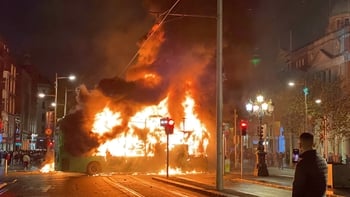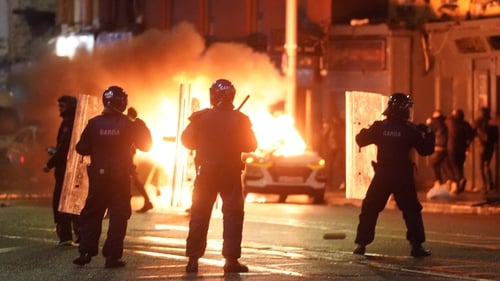ginnyg2
Full Member
   Don't blame me - I voted for someone else.
Don't blame me - I voted for someone else.
Posts: 401
Member is Online
|
Post by ginnyg2 on Apr 13, 2024 9:37:34 GMT
|
|
|
|
Post by patman post on Apr 13, 2024 14:00:16 GMT
|
|
ginnyg2
Full Member
   Don't blame me - I voted for someone else.
Don't blame me - I voted for someone else.
Posts: 401
Member is Online
|
Post by ginnyg2 on Apr 14, 2024 14:09:27 GMT
From the article:
In recent months, the International Protection Accommodation Service (IPAS), has struggled to provide beds for asylum seekers arriving in the country due to a “severe shortage” in accommodation.
Since December 4th, 593 male applicants have arrived into the country. Of those, 523 were not initially offered accommodation. A total of 66 were then provided with accommodation, leaving 457 homeless.
So the invaders are adding to the problem.
|
|
Deleted
Deleted Member
Posts: 0
|
Post by Deleted on Apr 14, 2024 20:14:28 GMT
From the article: In recent months, the International Protection Accommodation Service (IPAS), has struggled to provide beds for asylum seekers arriving in the country due to a “severe shortage” in accommodation. Since December 4th, 593 male applicants have arrived into the country. Of those, 523 were not initially offered accommodation. A total of 66 were then provided with accommodation, leaving 457 homeless. So the invaders are adding to the problem. The problem is the solution for some. Discussion will simply be met with those stalling for time, because that's all they need. There's a reason why this establishment is talking about conscription. Who would voluntarily fight for this establishment?
|
|
|
|
Post by Red Rackham on Apr 19, 2024 13:19:22 GMT
Ireland’s anti-immigration backlash is spiralling into country-wide unrest. Republican voters are turning against Sinn Fein as they reject the party’s open borders stance. Protests, arson attacks and hardening anti-immigration views have transfused Irish politics with a fervour not seen since the Troubles. Michael Murphy went to Ireland to make a documentary for The Telegraph to find out what Irish people make of the growing strife. I started my journey in Dublin, where hundreds of people turned out for an anti-immigration march. Amid a sea of Irish tricolour flags, protestors chanted “get them out” about the government over its support for mass migration – which many felt was conferring already sparse housing and public services to foreigners, to the detriment of Irish citizens. One woman said she was scared to leave the house because of the amount of “unvetted male people” who’ve arrived in Ireland in recent years. The Irish government were not the only villains of the event – much ire was directed at “higher powers’’, variously the European Union and the World Economic Forum. Leo Varadkar’s trip to Davos last month when anti-immigration protests across the country reached a high-point no doubt did little to disabuse them of the impression that his priorities lie elsewhere. Demonstrators also belted “Ireland is for the Irish” and other slogans which would usually be the preserve of the republicans of Sinn Fein. But the party’s support for mass migration has alienated their Irish nationalist base, with many at the march branding them “traitors”. www.telegraph.co.uk/news/2024/02/19/mass-immigration-bringing-european-style-populism-ireland/There's a lot of civil unrest that's played down, like immigrant crime, the EU and left wing press prefer it to go unreported. But mass immigration will sooner or later cause mass civil unrest that will be too serious to be hidden or played down. People feel ignored, they are shouted down as racists for having genuine concerns and no one should be surprised that this is building a lot of resentment. Dublin has been described as a pressure cooker, one of many. |
|
|
|
Post by Red Rackham on Apr 29, 2024 14:43:18 GMT
|
|
|
|
Post by Vinny on Apr 29, 2024 19:43:57 GMT
Proper riots. Not good.
|
|
Deleted
Deleted Member
Posts: 0
|
Post by Deleted on May 10, 2024 7:33:07 GMT
I would argue that it's what England should have done decades ago.
|
|
|
|
Post by Handyman on May 27, 2024 6:31:22 GMT
A few days ago the Garda Irish Police stopped 20 Migrants on the border with NI, none of them had any ID therefore they sent sent back over the border
|
|
|
|
Post by Bentley on May 27, 2024 9:40:36 GMT
Maybe the UK should facilitate migrant camps on the Irish border so the migrants can sneak into Eire when the guards aren’t looking .
We can ask France how its done.
|
|
|
|
Post by Handyman on May 27, 2024 10:05:16 GMT
Maybe the UK should facilitate migrant camps on the Irish border so the migrants can sneak into Eire when the guards aren’t looking . We can ask France how its done. Reading the Irish press many are calling for border control with NI to stop them getting in, but others do not want any border at all they did not want one back in time for obvious reasons and they don't want one know |
|
Deleted
Deleted Member
Posts: 0
|
Post by Deleted on May 27, 2024 10:14:22 GMT
A few days ago the Garda Irish Police stopped 20 Migrants on the border with NI, none of them had any ID therefore they sent sent back over the border Is that at the border which the Irish insisted must not exist, with Varadkar in the Brexit negotiations. Now it exists. |
|
|
|
Post by Handyman on May 27, 2024 10:24:13 GMT
A few days ago the Garda Irish Police stopped 20 Migrants on the border with NI, none of them had any ID therefore they sent sent back over the border Is that at the border which the Irish insisted must not exist, with Varadkar in the Brexit negotiations. Now it exists. It is complicated and I only know a little about it This explains some of it The impact of Brexit on the Irish border and its adjacent polities involves changes in trade, customs, immigration checks, local economies, services, recognition of qualifications, medical cooperation, and other matters, now that it is the only land border between the United Kingdom and the European Union. After the UK Parliament voted to leave the European Union, all parties said that they want to avoid a hard border in Ireland, due particularly to the border's historically sensitive nature. Border issues were one of three areas of focused negotiation in the Withdrawal Agreement. Following the United Kingdom's exit from the European Union on 31 January 2020, this border is also the frontier between the EU and an external country. The Northern Ireland Protocol of the Brexit withdrawal agreement commits the UK and the EU to maintaining an open border in Ireland, so that (in many respects) the de facto frontier is the Irish Sea border between the two islands. This requires the continued application of the Common Travel Area as well as free trade of goods (including electricity) between Ireland and Northern Ireland. The latter requires the UK to follow EU law in Northern Ireland with respect to these areas, with jurisdiction of the European Court of Justice in the interpretation of the law. In 1922, the 26-county Irish Free State formally seceded from the United Kingdom as a self-governing dominion under the terms of the Anglo-Irish Treaty, setting the stage for full national independence, while the six-county Northern Ireland remained part of the United Kingdom. Consequently, the dividing line between these two parts of the island became an international border. Trade in goods and services across this frontier became subject to differing tax and tariff arrangements and an infrastructure of customs posts was put in place at designated crossing points. All traffic was subject to inspection by the jurisdiction it was entering. This could entail full vehicle searches with consequent delay and inconvenience. However, passport checks were not applied because the Republic of Ireland and Northern Ireland were part of the Common Travel Area.
Closer links
A number of bilateral and multilateral free trade agreements made goods checks less intrusive; the completion of the European Single Market in 1992 meant that checks on goods were phased out. However, during the Troubles in Northern Ireland, there were British military checkpoints on main border crossings and UK security forces made some, although not all, of the remaining crossings impassable. In 2005, in a phased implementation of the 1998 Good Friday Agreement, the last of the border checkpoints was removed.[1]
Good Friday Agreement
The British and Irish Governments:
Wishing to develop still further the unique relationship between their peoples and the close co-operation between their countries as friendly neighbours and as partners in the European Union;
Reaffirming their commitment to the principles of partnership, equality and mutual respect and to the protection of civil, political, social, economic and cultural rights in their respective jurisdictions;
Have agreed as follows:
British-Irish Agreement (appended to the Good Friday Agreement)[2]
Since about 2005, the border has been perceived as being invisible, with little or no physical infrastructure, as the security barriers and checkpoints were removed due to processes put in place by the Good Friday Agreement (or Belfast Agreement) signed in 1998.[2][c][3] This agreement has the status of both an international treaty between the United Kingdom and the Republic of Ireland (the British-Irish Agreement), as well as an agreement of the parties within Northern Ireland (Multi-Party Agreement).
Following Brexit, the border between Northern Ireland and the Republic of Ireland becomes an external EU border.[4] In theory, a "hard" border could return, with both fewer and supervised crossing posts, to support the necessary customs infrastructure.[5] Both EU and UK negotiating teams made clear that this outcome would not be acceptable in any final exit agreement.[6][7]
US Senator George Mitchell, who chaired the negotiations for the Belfast Agreement, has commented that he believes the creation of a border control system between the Republic of Ireland and Northern Ireland might jeopardise the agreement.[8] Research published on 18 February 2019 by Irish Senator Mark Daly and two UNESCO chairmen indicated that reinstating a hard border would result in the return of violence.[9][10][11][12]
Brexit referendum in Northern Ireland
In the June 2016 United Kingdom European Union membership referendum, Northern Ireland voted 55.8% to 44.2% in favour of remaining in the European Union. Support for remaining or leaving was largely divided along sectarian lines, with a majority in Catholic areas favouring Remain and a majority in Protestant areas favouring Leave.[13] In a November 2018 opinion poll commissioned by BBC Northern Ireland and RTÉ (Republic of Ireland), 61% of those polled believed that Brexit should not go ahead if the price is a hard border (versus 36% that it should, 3% don't know).[14] |
|
|
|
Post by bancroft on Jun 16, 2024 12:23:53 GMT
I would argue that it's what England should have done decades ago.
Ireland does not have the BBC............ |
|
|
|
Post by Vinny on Jun 25, 2024 8:46:02 GMT
There were anti immigration protests and clash with police over the weekend in towns across Ireland. As far as I'm aware there's almost a news blackout on UK TV, apart from GB News, obviously.    Riots are more than protests, but what do you expect from a nation that was founded by violent uprising, when faced with mass immigration they didn't ask for. |
|